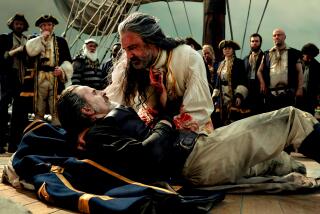A Pirate Ship Too Safe at Anchor : KICK THE CAN <i> by Jim Lehrer (G. P. Putnam’s Sons: $17.95; 256 pp.) </i>
- Share via
Bad practice, I know, to judge a book by the face of the author, but I can’t help myself. Every evening for several evenings I have been running into the TV room to gaze upon the face of Jim Lehrer, my object being to try to understand him, try to match the man with this novel he has written called “Kick the Can.”
In this novel, a boy named Mack, 16 years old, loses an eye in an accident during a game of Kick the Can. This happens in Kansas, where the boy was born and raised, even as Lehrer himself. The boy’s father was a member of the Kansas State Highway Patrol, and the boy had hoped to be a patrolman, too, but the loss of his eye disqualified him from that good job and from others. In vain, he wishes he could be a clerk in the bus depot, for he loves buses.
The One-Eyed Mack leaves Kansas for Texas, intending to become a pirate--the only job left open for a man wearing an eye patch. For the first time in his life, he eats alone in a restaurant, checks into a hotel, meets a Mexican. He loves Milky Way candy bars and “grapette” drink. He feels himself pursued by his father, whose manner of walking resembles the stride of Alan Ladd. This book is awash with the names of figures of prominence at the time of the action--J. Edgar Hoover; the baseball players Stan the Man Musial and Harry the Cat Brecheen; Dwight D. Eisenhower; Jack Benny; Allan Shivers, once governor of Texas; Chester Morris; Roy Rogers; Dale Evans; Gabby Hayes, and Trigger, the horse.
On a train, Mack meets a young criminal named Tom, with whom he becomes best buddies and with whom he performs a few small thefts. Mack steals a volume valuably related to his love of buses: “Russell’s Official National Motor Coach Guide.” He will never make pirate, but he settles briefly in a career as a landlocked Robin Hood.
Mack’s friend Tom meets and marries a woman named Jackie, whom Mack secretly loves. Tom dies a war hero, The One-Eyed Mack marries Jackie, and they live happily ever after.
One-Eyed Mack tells this story in a voice intended to sound like his own. Thus, Lehrer has burdened Mack and himself with an extreme literary difficulty that may be expressed as a rational incapacity to play an irrational role. Boy, am I cuckoo, Mack seems to say; boy, am I zany; boy, am I out of this world. He defines men in baseball terms--”He was a perfect third-baseman type”--but the type does not exist in life or in baseball.
Lehrer has challenged material beyond his control. Unable to reveal his own unconscious lie in his own language, he entrusts it to One-Eyed Mack to tell. That is a mistake. The unsatisfactory style of the novel seems to me to be the result of Mack’s effort to speak like a bumpkin while being sabotaged by Lehrer’s grammatical fastidiousness.
Lehrer on my TV screen these recent nights remains as I have always known him, rational, reasonable, straightforward and unemotional, respectful of the newsworthy people with whom he converses, and responsible to the facts insofar as they can be known. Lehrer has been playing this useful role for 13 years on PBS.
Earlier, he had been a newspaperperson for 20 years. He was reared in Kansas, just like Mack, and served in the Marines like Mack’s friend Tom. For years and years as a journalist, he has reported dreadful wars, doubtful or cynical public figures, conventional celebrations, and empty ceremonies like the event suggested by the unveiling of the memorial to Mack’s friend Tom on the courthouse lawn in Adabel, Okla.
On his broadcast, every night is a big responsibility. Co-anchor Lehrer cannot run off to piracy, defying the law of his efficient father, the Kansas patrolman, however deeply Jim Lehrer (that’s the name he goes by: Jim) yearns to abandon himself to unreason. The years of journalism have trained out of his system the ability to play, to flaunt irreverence at the expense of data. He has never been permitted, or never permitted himself, to break from the grave responsibility of truth-telling.
At storytelling, he is less good. Boys who know almost nothing can’t really tell us anything, either, or write sophisticated books. Jim Lehrer can’t go home again. He has been too long away. He cannot, after years of admirable restraint in the journalistic discipline, resuscitate playfulness, nonsense, unreason, or live anew the life he spurned for the life of--what?
Of anchor man.
Anchored, he sails no pirate ship to sea. He is doomed five nights a week to one of the most public performances anyone has ever undertaken--one full hour in the national eye. It should have been exciting. Tell us, Mr. Lehrer, the true tale of your fantasies raised to consciousness, not in the ersatz voice of the One-Eyed Mack but in your own.
More to Read
Sign up for our Book Club newsletter
Get the latest news, events and more from the Los Angeles Times Book Club, and help us get L.A. reading and talking.
You may occasionally receive promotional content from the Los Angeles Times.









